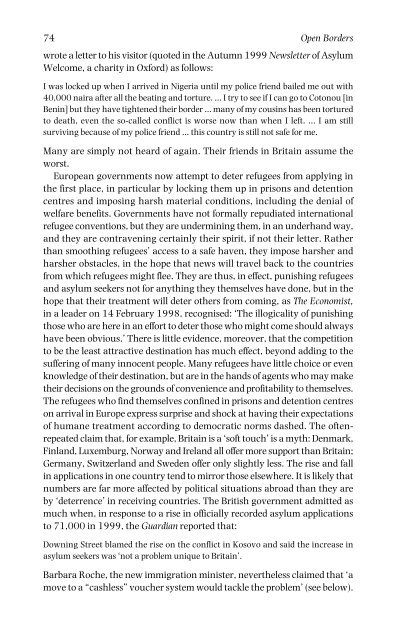Open%20borders%20The%20case%20against%20immigration%20controls%20-%20Teresa%20Hayter
Open%20borders%20The%20case%20against%20immigration%20controls%20-%20Teresa%20Hayter
Open%20borders%20The%20case%20against%20immigration%20controls%20-%20Teresa%20Hayter
Create successful ePaper yourself
Turn your PDF publications into a flip-book with our unique Google optimized e-Paper software.
74 Open Borders<br />
wrote a letter to his visitor (quoted in the Autumn 1999 Newsletter of Asylum<br />
Welcome, a charity in Oxford) as follows:<br />
I was locked up when I arrived in Nigeria until my police friend bailed me out with<br />
40,000 naira after all the beating and torture. ... I try to see if I can go to Cotonou [in<br />
Benin] but they have tightened their border ... many of my cousins has been tortured<br />
to death, even the so-called conflict is worse now than when I left. ... I am still<br />
surviving because of my police friend ... this country is still not safe for me.<br />
Many are simply not heard of again. Their friends in Britain assume the<br />
worst.<br />
European governments now attempt to deter refugees from applying in<br />
the first place, in particular by locking them up in prisons and detention<br />
centres and imposing harsh material conditions, including the denial of<br />
welfare benefits. Governments have not formally repudiated international<br />
refugee conventions, but they are undermining them, in an underhand way,<br />
and they are contravening certainly their spirit, if not their letter. Rather<br />
than smoothing refugees’ access to a safe haven, they impose harsher and<br />
harsher obstacles, in the hope that news will travel back to the countries<br />
from which refugees might flee. They are thus, in effect, punishing refugees<br />
and asylum seekers not for anything they themselves have done, but in the<br />
hope that their treatment will deter others from coming, as The Economist,<br />
in a leader on 14 February 1998, recognised: ‘The illogicality of punishing<br />
those who are here in an effort to deter those who might come should always<br />
have been obvious.’ There is little evidence, moreover, that the competition<br />
to be the least attractive destination has much effect, beyond adding to the<br />
suffering of many innocent people. Many refugees have little choice or even<br />
knowledge of their destination, but are in the hands of agents who may make<br />
their decisions on the grounds of convenience and profitability to themselves.<br />
The refugees who find themselves confined in prisons and detention centres<br />
on arrival in Europe express surprise and shock at having their expectations<br />
of humane treatment according to democratic norms dashed. The oftenrepeated<br />
claim that, for example, Britain is a ‘soft touch’ is a myth: Denmark,<br />
Finland, Luxemburg, Norway and Ireland all offer more support than Britain;<br />
Germany, Switzerland and Sweden offer only slightly less. The rise and fall<br />
in applications in one country tend to mirror those elsewhere. It is likely that<br />
numbers are far more affected by political situations abroad than they are<br />
by ‘deterrence’ in receiving countries. The British government admitted as<br />
much when, in response to a rise in officially recorded asylum applications<br />
to 71,000 in 1999, the Guardian reported that:<br />
Downing Street blamed the rise on the conflict in Kosovo and said the increase in<br />
asylum seekers was ‘not a problem unique to Britain’.<br />
Barbara Roche, the new immigration minister, nevertheless claimed that ‘a<br />
move to a “cashless” voucher system would tackle the problem’ (see below).


